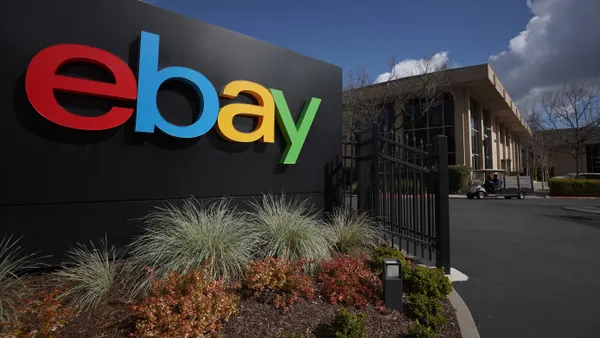Dive Brief:
-
Alibaba has allocated more than $1.3 billion in recent days for separate investments in two Chinese firms, one a home furnishings retailer and the other a company that help retailers with big data analysis, according to a TechCrunch post.
-
About $867 million of that outlay is being put into Beijing EasyHome Furnishings, a brick-and-mortar retailer whose 223 stores offer home décor and home improvement merchandise. The investment will translate into a 15% stake in the second largest retailer of its kind in China.
-
The EasyHome deal follows Alibaba's pledge of $486 million for a 38% stake in Shiji Retail Information Technology, a provider of software and data systems to the retail and hospitality industries.
Dive Insight:
These investments are the latest moves in Alibaba's "New Retail" strategy, an effort to expand its business model to one that has footholds in both the e-commerce and brick-and-mortar sectors. For an e-commerce giant like Alibaba, that means a lot of investments to expand into a brick-and-mortar sector that many retailers are trying to expand out of.
The EasyHome deal comes after Alibaba has invested in or increased an existing stake in a handful of other retail firms over the last couple of years. Those include electronics retailer Suning, which Alibaba poured $4.6 billion into in 2015, and food retailer Sun Art, which drew an Alibaba investment of almost $3 billion last year. Alibaba also last year created a joint venture with China's Bailian Group, which owns thousands of brick-and-mortar stores, and developed a plan to build a brick-and-mortar shopping mall on its own.
On top of all these moves, the Shiji investment is a bet on technology that may help Alibaba's stable of brick-and-mortar investments pay off. Its offerings include visual counter systems, mobile point-of-sale systems and other types of store management software. The company has worked with retailers like Starbucks, but also caters to department stores and shopping malls.
Alibaba isn't the only one-time pure-play e-commerce company trying to do this. Amazon, Bonobos, Warby Parker, Untuckit and many others have made concerted efforts in the last couple of years to create (or acquire) a presence in the brick-and-mortar sector that they otherwise have done their darnedest to disrupt. We can assume that Alibaba sees in brick-and-mortar what other pure-play e-commerce companies see: an opportunity to engage more directly with customers on a personal level.
It may be the ultimate irony, but as more retail sales swing toward e-commerce and mobile commerce, the companies that are benefiting most from that movement are spending a lot of money to revisit the sector's brick-and-mortar foundation.











